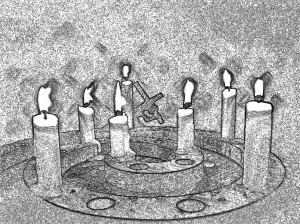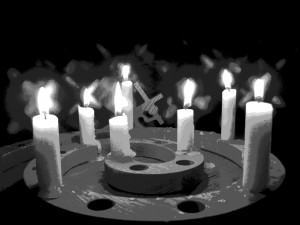To hear my blog post read aloud, just click the play button. If you’re reading this in an email, you may have to click here to hear the post on my site.
















Donald Trump is a crooked, underhanded con artist and…a spoiled, overgrown brat. – Matt Walsh on The Blaze








Art credit: Photos of various cathedrals by Kirk Sewell




“Young people tend to be activists, dedicated supporters of a cause, though without always inquiring too closely either whether their cause is a good end to pursue or whether this action is the best means by which to pursue it.” ~ Rev. John R. W. Stott in an address at the Inter-Varsity Fellowship Annual Conference









Thanks to Kirk Sewell for turning the colors of my photographs into various shades of gray. You can see more of his work at http://photographybysewell.webs.com
I overheard someone the other day.
I wasn’t trying to “drop any eaves”, but he was speaking quite loudly.
“Our churches are turning into places of moral relativism, places where young people come to hear abstract ideas that have no bearing on their daily lives. What’s the matter with young people today? Why can’t they understand Truth?”
It’s a fair question. It does seem as though many who claim to follow Christ show up at church every now and then but ignore Him at all other times.
This older man’s complaint made me think of a book I read a few months ago: The Divine Conspiracy by Dallas Willard. He speaks of this idea quite a bit and says things such as this:
Consumer Christianity is now normative. The consumer Christian is one who utilizes the grace of God for forgiveness and the services of the church for special occasions, but does not give his or her life and innermost thoughts, feelings and intentions over to the kingdom of the heavens.
Many things in this book caused wonderings to whirl about inside of me (Dallas Willard does this to you). Is this really true, that Consumer Christianity is normative in our time and place? If so, how can I protect my children against this? How can we, as a Church, change this?
It is not often that I find a book that directly and perfectly answers a set of ideas and questions that I have been mulling over, but I found it in this case in a book called Souls in Transition by Christian Smith.
This is a book full of numbers, statistics and research, a book that I struggled in places to understand, but it is also a book about what young adults believe about God and religion and, more importantly to me, what in their youth caused them to believe those things.
I won’t bore you with the details of their research; for this essay suffice it to say that there were significant numbers of youth that were followed and interviewed over many years as they grew up. I surmise that even my statistician brother would be content with their procedures and numbers.
How has this happened? How is it that our churches are not giving our teens and young adults a sense of belonging? How is it that even those who attend church have such a disconnect between what they believe and how they live?
As frightening as all of the statistics were, however, the statistics about those young adults who did have a strong internal and external faith were encouraging. It has almost everything to do with the parents.
Did you hear that?
Even in this day when peers are so very influential to teenagers, the parents still have the most influence of all!
That is a beautiful thought.
The importance of faith, prayer and Bible reading in the parents’ lives makes “enormous substantive difference in religious outcomes during emerging adulthood”.
Be encouraged, you parents.
Those of you who pray with your children, read the Bible with your children, show your children how to live a life of faith – it is affecting your children’s hearts and it will be the most important factor (earthly factor, of course!) in the shaping of their adult lives.
I was so relieved when I read those words. I get nervous about the teen years, as do most parents, and was grateful to discover that I and my husband will still be the most important influencers in their lives, even as teenagers.
Yet I still wondered about all of the children who do not have godly parents. Are those children simply out of luck?
And then I read this: almost as effective as having faithful parents was having another supportive, religious adult who played a major role in the teenager’s life.
What grace from God! What a beautiful way to design things: even if the parents of a child do not obey God, as long as someone else is willing to step into that role, the teen will still remain faithful as a young adult.
Do you see what that means?
It is up to us, the church, to influence our world, our teens for God. Grandparents, parents, singles, young adults, it is up to you.
Be encouraged, you church.
God has given you the power to change lives. You who pray, read the Bible and serve – bring a teenager into your circle. You can be a huge influence in shaping their adult life, even if you are not their parent.
Talk with your youth minister, your children’s minister; look around your neighborhood. Find out if there are any nearby who need your support, who need you to listen and to speak truth into their lives.
If we each only took one? I imagine that we could change that “normative consumer Christianity” into normative discipleship Christianity.
That is a beautiful thought.